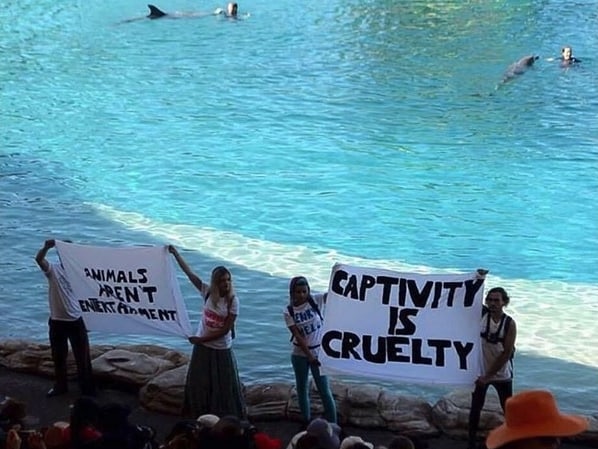Should Canada follow the U.S.’s lead and move dolphins out of captivity?


Should Canada move dolphins out of captivity?
In response to continuing protests by animal rights advocates, the National Aquarium in Baltimore, Maryland, has announced that it will move its dolphins from the aquarium’s amphitheater pool to an oceanside sanctuary at a yet-to- be-determined location by the year 2020.
“We now know more about dolphins and their care, and we believe that the National Aquarium is uniquely positioned to use that knowledge to implement positive change,” said John Racanelli, CEO of the National Aquarium.
The move has been greeted with praise from many quarters, with animal rights group PETA calling it a “monumental decision” and United States Humane Society CEO Wayne Pacelle writing that the National Aquarium’s plans are “more evidence that animal-based facilities” are adapting to cultural shifts and prioritizing the animals’ well-being.
This past May, the National Aquarium was one of 61 facilities around the world that faced protests in an event called Empty the Tanks Worldwide, which called on aquariums to end the practice of keeping whales and dolphins in captivity. The National Aquarium shut down its dolphin show in 2012 and has since kept its dolphins in an amphitheater for public viewing.
Last month, the Vancouver Aquarium in Vancouver, BC, was also met with an Empty the Tanks protest, as dozens of people marched outside the building and shouted slogans. Now celebrating its 60th year in business, the Vancouver Aquarium was the subject of reproach by chimpanzee expert Jane Goodall, who wrote to the Vancouver Park Board and requested that it phase out the practice of keeping and breeding belugas, dolphins and porpoises at the Stanley Park facility.
Across Canada, there is growing evidence of lower tolerance for animal-based attractions at amusement parks and attractions, including zoos, circuses and aquariums. Many Canadians applauded the the Ringling Brothers’ circus recent decision to close its performing elephants act, and Marineland in Niagara Falls, Ontario, is currently under fire for its stance on captive animals, drawing hundreds of protestors at its 2016 opening day.
A bill is currently before the Senate which calls for a ban on the acquisition or breeding of marine mammals in Canada. Tabled by Nova Scotia Senator Wilfred Moore, Bill S-203 would end the captivity of whales, dolphins and porpoises in Canada. The province of Ontario recently amended its Prevention of Cruelty to Animals Act to extend protections of marine animals, for instance, by giving the province the power to assign animal welfare committees to facilities housing marine animals.
The Senate bill garnered the backing of the BC SPCA as well as Green Party Member of Parliament, Elizabeth May, both of whom signed an e-petition in support of the bill. “The BC SPCA recognizes the complex need of cetaceans, and their highly sentient and social nature,” said chief scientific officer for the BC SPCA, Dr. Sara Dubosi, who added that “it is time to phase out these displays.”
The CBC reports that Marineland currently has bottlenose dolphins in its possession, along with beluga whales and one killer whale -the only one in captivity in Canada- while the Vancouver Aquarium currently has harbour porpoises, beluga whales, a false killer whale and a Pacific white-sided dolphin.

